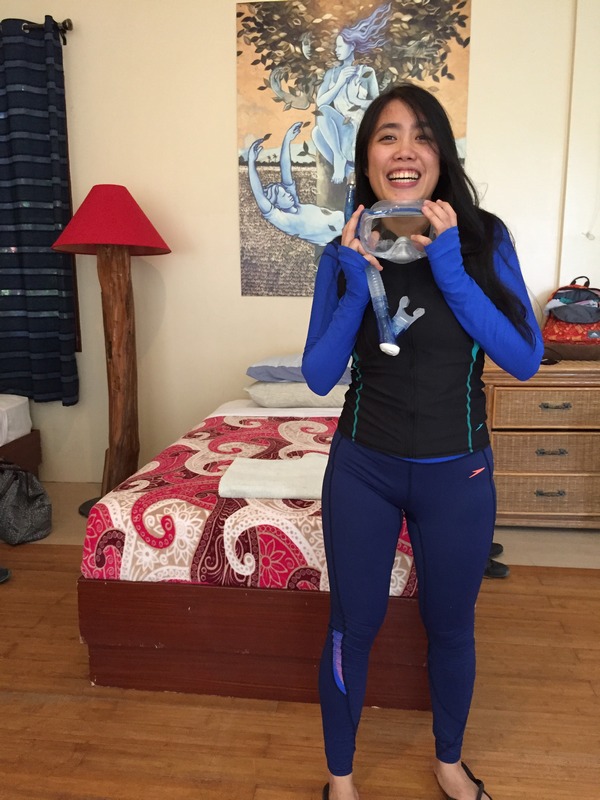
Meg Modequillo sets up AMUMA where she sells reusable or recyclable items like the bamboo toothbrush (second photo) and the steel cutlery (third photo).
Meg Modequillo’s environment-friendly business was born of a New Year’s gathering with friends which had them share and exchange resolutions.
One of her friends mentioned that she wanted to practice a zero-waste lifestyle.
The statement struck Modequillo, 26, because she works for an environmental organization but has not aimed to live a zero-waste lifestyle until her friend floated the idea.
“I took a good look at everything I owned and gathered what I thought would be of good use to bring everywhere I go,” she said.
“I found a light reusable shopping bag, some foldable cutlery and a water bottle,” recalled Modequillo.
She also stopped using plastic straws.
To practice this lifestyle, however, means refusing single-use products and looking for items that are washable and can be repeatedly used.
Modequillo searched and found sellers of reusable products from Manila.
She then told more friends about her personal decision to minimize her waste production.
Her passion and energy also inspired them to think about a lifestyle change.
“One thing led to another and eventually, they heavily encouraged me to turn it into a business,” said Modequillo, a Chemical Engineering graduate of the University of San Carlos.
On April 2018, she started AMUMA Cebu Eco-products with a P15,000 capital pooled from her savings.
She currently buys her supplies from various sources in Manila and Negros Occidental.
“I just started selling reusables because I wanted to enable people to minimize their wastes by making reusable products available in Cebu,” she said.
Unlike Manila, she said there are only a handful of Cebu-based stores like AMUMA which sells “zero-waste” product options.
Modequillo advocates for minimizing or reducing wastes over recycling.
“The concept of minimizing our wastes here isn’t that popular yet and I think it should be. When I was a kid, most of the focus has been on recycling when in fact reduction of our waste should be of more priority,” she said.
Modequillo said residual wastes go to landfills and recyclables do not always get recycled.
“Even if they do get recycled, they may undergo processing that’s also resource-extractive or pollutant-generating,” she said.
Modequillo said waste reduction should still be the first course of action if we would want to stop letting garbage take over our seas and our land.
Meaning
The business name was inspired by the Visayan word “amuma” which means “to nurture” in English.
“We want to provide alternatives to everyday items that are less damaging to our beautiful blue planet,” said Modequillo, who is also taking up her post-graduate studies in Environmental Studies from the University of the Philippines Cebu.
What sets the business apart from others is the platform by which it stands: a convergence of passion, position, and action.
For Modequillo, she utilized her passion and love for the environment as a springboard for building a meaningful business.
“The natural environment is very close to my heart and I’m quite exposed to the world of waste management and processing. I’ve seen firsthand where our wastes go,” she said.
Clients
While she only started AMUMA this year, Modequillo has been earning her own money when she was in college by selling baked goods and handmade jewelry items.
After college, she tried working as freelance artist for video games.
Since she started, her customers are people between the ages of 20 and 30. Recently, she has noticed customers who are already in their 40s.
“Since I’m mostly surrounded by people concerned with the environment, I think I can say it’s been a rather easy start for me to get people to buy the items I’ve been selling,” she said.
Modequillo originally intended to run a business that would solve environmental problems in her 40s.
“I never imagined I’d be running any type of business at around this stage in my career. However, I saw a need for waste minimization options that I wanted to address as soon as possible,” she said.
Growth
To promote her products, Modequillo utilized the power of social media to reach out to potential clients and address repeat orders from existing customers.
This meant being active on social media to promote AMUMA even when she feels uncomfortable in sharing snippets of her life in public.
“For a business to thrive in this day and age, I don’t think there’s any other way to go about it (but to utilize social media). I had to be active in social media for AMUMA,” she said.
With a growing interest about the products, Modequillo is working on officially registering AMUMA as a business entity.
She is also hoping to grow his product list.
“I choose products with two criteria in mind. One, when people will be ready to make the switch with them and two, I myself would like to use them too,” she said.
“I’ve been testing products a lot and picking out the ones that fit those criteria,” added Modequillo.
For Modequillo, AMUMA is more than just a business.
It is a personal advocacy that she hopes will progress into a social movement.